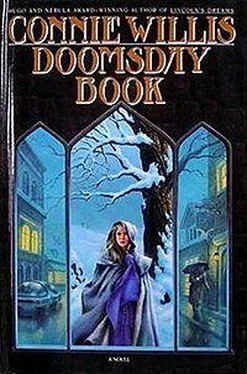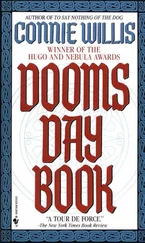Dunworthy wondered how many of those two-hour intervals Badri would hold up for. He looked done in already.
"When you see the shimmer or the beginnings of moisture condensation, move into the rendezvous area," Badri said.
"What if it's dark?" Colin asked. He had taken off the lab coat, and Dunworthy saw that he was in his squire's costume.
"You should still be able to see the shimmer, and we'll call out to you," Badri said. He grunted softly and put his hand to his side again. "You've been immunized?"
"Yes."
"Good. All we're waiting for then is the med support." He looked hard at Dunworthy. "Are you sure you're well enough to do this?"
"Are you?" Dunworthy asked.
The door opened and William's nurse came in wearing a slick. She blushed when she saw Dunworthy. "William said you needed med support. Where would you like me to set up?"
I must remember to warn Kivrin about him, Dunworthy thought. Badri showed her where he wanted her, and Colin ran out after her equipment.
Montoya led Dunworthy over to a chalked circle under the shields. "Are you going to wear your spectacles?"
"Yes," he said. "You can dig them up in your churchyard."
"I'm certain they won't be there," she said solemnly. "Do you want to sit or lie down?"
He thought of Kivrin, lying with her arm across her face, helpless and blind. "I'll stand," he said.
Colin came back in with a steamer trunk. He set it down by the console and came over to the net. "You've no business going by yourself," he said.
"I must go by myself, Colin."
"Why?"
"It's too dangerous. You can't imagine what it was like during the Black Death."
"Yes, I can. I read the book through twice, and I've had my — " He stopped. "I know all about the Black Death. Besides, if it's as bad as all that, you shouldn't go by yourself. I wouldn't get in the way, I promise."
"Colin," he said helplessly, "you're my responsibility. I can't take the risk."
Badri came over to the net, carrying a light measure. "The nurse needs help with the rest of her equipment," he said.
"If you don't come back, I'll never know what happened to you," Colin said. He turned and ran out.
Badri made a slow circuit of Dunworthy, taking measurements. He frowned, took hold of his elbow, took more measurements. The nurse came over with a syringe. Dunworthy rolled up the sleeve of his doublet.
"I want you to know I don't approve of this at all," she said, swabbing Dunworthy's arm. "Both of you properly belong in hospital." She plunged the syringe in and walked back to her steamer trunk.
Badri waited while Dunworthy rolled down his sleeve and then moved his arm, took more measurements, moved it again. Colin carried a scan unit in and went back out without looking at Dunworthy.
Dunworthy watched the display screens change and change again. He could hear the bellringers, an almost musical sound with the door shut. Colin opened the door, and they clanged wildly for a moment while he maneuvered a second steamer trunk through the door.
Colin dragged it over to where the nurse was setting up, and then went over to the console and stood beside Montoya, watching the screens generate numbers. He wished he had told them he would go through sitting down. The stiff boots pinched his feet, and he felt tired from the effort of standing still.
Badri spoke into the ear again, and the shields came down, touched the floor, draped a bit. Colin said something to Montoya, and she glanced up, frowned and then nodded, and turned back to the screen. Colin walked over to the net.
"What are you doing?" Dunworthy said.
"One of the curtain things is caught," he said. He walked to the far side and tugged on the fold.
"Ready?" Badri said.
"Yes," Colin said and backed away toward the prep door. "No, wait." He came back up to the shields. "Shouldn't you take your spectacles off? In case somebody sees you come through?"
Dunworthy removed his spectacles and tucked them inside his doublet.
"If you don't come back, I'm coming after you," Colin said, and backed away. "Ready," he called.
Dunworthy looked at the screens. They were nothing but a blur. So was Montoya, who had leaned forward over Badri's shoulder. She glanced at her digital. Badri spoke into the ear.
Dunworthy closed his eyes. He could hear the bellringers banging away at "When at Last My Savior Cometh." He opened them again.
"Now," Badri said. He pushed a button, and Colin darted toward the shields and under, straight into Dunworthy's arms.
They buried Rosemund in the grave the steward had dug for her. "You will have need of these graves," the steward had said, and he was right. They would never have managed to dig it themselves. It was all they could do to carry her out to the green.
They laid her on the ground beside the grave. She looked impossibly thin lying there in her cloak, wasted almost to nothing. The fingers of her right hand, still half-curved around the apple she had let drop, were nothing but bones.
"Heard you her confession?" Roche asked.
"Yes," Kivrin said, and it seemed to her that she had. Rosemund had confessed to being afraid of the dark and the plague and being alone, to loving her father and to knowing she would never see him again. All the things that she herself could not confess.
Kivrin unfastened the loveknot pin Sir Bloet had given Rosemund and wrapped the cloak around her, covering her head, and Roche picked her up in his arms like a sleeping child and stepped down into the grave.
He had trouble climbing out, and Kivrin had to take hold of his huge hands and pull him out. And when he began the prayers for the dead, he said, " Domine, ad adjuvandum me festina ."
Kivrin looked anxiously at him. We must get away from here before he catches it, too, she thought, and didn't correct him. We don't have a moment to lose.
" Dormiunt in somno pacis ," Roche said, and picked up the shovel and began filling in the grave.
It seemed to take forever. Kivrin spelled him, chipping at the mound that had frozen into a solid mass and trying to think how far they could get before nightfall. It wasn't noon yet. If they left soon, they could get through the Wychwood and across the Oxford-Bath road onto the Midland Plain. They could be in Scotland within the week, near Invercassley or Dornoch, where the plague never came.
"Father Roche," she said as soon as he began tamping down the dirt with the flat of the shovel. "We must go to Scotland."
"Scotland?" he said, as if he had never heard of it.
"Yes," she said. "We must go away from here. We must take the donkey and go to Scotland."
He nodded. "We must carry the sacraments with us. And ere we go I must ring the bell for Rosemund, that her soul may pass safely unto heaven."
She wanted to tell him no, that there wasn't time, they must leave now, immediately, but she nodded. "I will fetch Balaam," she said.
Roche started for the bell tower, and she took off running for the barn before he had even reached it. She wanted them to be gone now, now, before anything else happened, as if the plague were waiting to leap out at them like the bogeyman from the church or the brewhouse or the barn.
She ran across the courtyard and into the stable and led the donkey out. She began to strap his panniers on.
The bell tolled once, and then was silent, and Kivrin stopped, the girth strap in her hand, and listened, waiting for it to ring again. Three strokes for a woman, she thought, and knew why he had stopped. One for a child. Oh, Rosemund.
She tied the girth strap and began to fill the panniers. They were too small to hold everything. She would have to tie the sacks on. She filled a coarse bag with oats for the donkey, scooping it out of the grain bin with both hands and spilling whole handfuls on the filthy floor, and knotted it with a rough rope that hung on Agnes's pony's stall. The rope was tied to the stall with a heavy knot she couldn't untie. She ended by having to run to the kitchen for a knife and back again, bringing the sacks of food she had gathered up earlier.
Читать дальше












